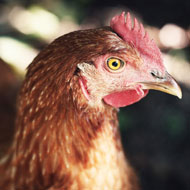
Birds required to be housed until 28 February
The UK’s chief veterinary officer has extended the avian influenza prevention zone which requires poultry and other captive birds to be housed indoors.
Originally set to end on 6 January, the requirement has been extended until 28 February to help protect birds from avian influenza.
The H5N8 strain of avian influenza has been circulating in Europe for a number of weeks. An outbreak was detected at a turkey farm in Lincolnshire on 16 December, and in a backyard flock in Carmarthenshire on 3 January. It has also been confirmed in wild birds in England, Scotland and Wales in recent weeks.
Chief veterinary officer Nigel Gibbens commented: “Recent H5N8 avian flu findings in wild birds and a backyard flock in Wales highlight just how essential it is to minimise contact between wild and captive birds and maintain good biosecurity to reduce the risk of infection.
“We must continue to be vigilant and do all we can to protect against this highly pathogenic strain of the disease, which is why we are extending the Prevention Zone, have introduced a ban on poultry gatherings and continue to strengthen surveillance to understand the extent of infection in wild birds.”
Under the prevention zone, keepers in England are required to keep birds indoors or take practical steps to keep them separate from wild birds. Similar measures have been implemented in Scotland and Wales, and there is a GB-wide ban on poultry shows and gatherings.
Poultry keepers must also practice good biosecurity to limit the risk of infection spreading through feed, clothing and equipment.
Mr Gibbens added: “The Prevention Zone means anyone who keeps poultry such as chickens, ducks and geese, even as pets, must take action to stop them coming into contact with wild birds to protect them from avian flu.
“Birds should be moved into a suitable building, or if that isn’t possible owners must take sensible precautions to keep them away from wild birds, like putting up netting to create a temporary enclosure and keeping food and water supplies inside where they cannot be contaminated by wild birds.
“Even when birds are kept indoors a risk of infection remains so keepers must also practice good biosecurity, for example by disinfecting footwear and equipment and washing clothing after contact with birds.”



 The RCVS has announced a new version of its 1CPD mobile app, with enhanced features for veterinary surgeons and veterinary nurses to record their continuing professional development.
The RCVS has announced a new version of its 1CPD mobile app, with enhanced features for veterinary surgeons and veterinary nurses to record their continuing professional development.